|
|
|
Sort Order |
|
|
|
Items / Page
|
|
|
|
|
|
|
| Srl | Item |
| 1 |
ID:
060478
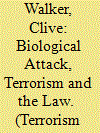

|
|
|
|
|
| Publication |
Jan 2005.
|
| Summary/Abstract |
According to President George W. Bush, we are living amidst ‘the first war of the twenty-first century’. How then should the United Kingdom react? It is suggested that at least two strands of legal policy and response should be considered. The first concerns the design of antiterrorism laws and policies. For the purposes of this paper, the remit will be confined to how antiterrorism laws have responded to the threat from biological attack. The second aspect concerns the laws and policies about terrorism risk management, part of the agenda of which takes us back to threats to health from biological attack.
|
|
|
|
|
|
|
|
|
|
|
|
|
|
|
|
| 2 |
ID:
060459


|
|
|
|
|
| Publication |
2005.
|
| Summary/Abstract |
The Al Qaeda type of terrorist is quite different from that of those of the IRA or Hezbollah. The former is seeking a clash of civilizations or at least a clash between the Islamic world and the West or at least between Islam and the US. The latter used and use terrorism to pursue a specific objective and a limited one at that in scope and geography. Terrorism is not a one dimensional phenomenon.
|
|
|
|
|
|
|
|
|
|
|
|
|
|
|
|
| 3 |
ID:
060480
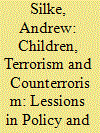

|
|
|
|
|
| Publication |
Jan 2005.
|
| Summary/Abstract |
Children are all too often the victims of terrorist conflicts and, as the Beslan school siege tragically illustrated, this victimisation can be extreme, deliberate and intentional. While all victims of terrorism attract a special interest, child victims unquestionably attract the most. Following this, how terrorist groups and governments initiate and react to violence which kills and maims children can play a major role in how conflicts are perceived and in how campaigns unfold. A failure to appreciate the critical issues surrounding the victimisation of children risks undermining perceived legitimacy, eroding wider support and increasing the backing opponents enjoy. Drawing on a variety of case studies, this article provides a review of how the victimisation of children has impacted in recent terrorist conflicts. Implications for policy and practice are highlighted.
|
|
|
|
|
|
|
|
|
|
|
|
|
|
|
|
| 4 |
ID:
060476
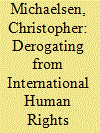

|
|
|
|
|
| Publication |
Jan 2005.
|
| Summary/Abstract |
This article examines the United Kingdom's Anti-terrorism, Crime and Security Act 2001 and the Australian Security Intelligence Organisation Legislation Amendment (Terrorism) Act 2002 (Cth) from an international human rights law perspective. It argues that both pieces of legislation raise serious concerns in relation to international legal obligations under the European Convention on Human Rights and the International Covenant on Civil and Political Rights. Both international treaties allow for ‘derogation’ from certain provisions in times of ‘public emergency’. While the United Kingdom has officially derogated from some of its treaty obligations, Australia has yet to submit a similar notification. This article argues, however, that the United Kingdom's derogation is unlawful. Likewise, current circumstances in Australia would not permit lawful derogation from the ICCPR.
|
|
|
|
|
|
|
|
|
|
|
|
|
|
|
|
| 5 |
ID:
060466
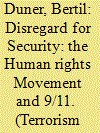

|
|
|
|
|
| Publication |
Jan 2005.
|
| Summary/Abstract |
International human rights NGOs have warned that human rights have been threatened since September 11. However, the matter is complicated since what is involved is in reality a relationship between two concepts: human rights and security against terrorism. This article demonstrates that there is a tendency for international human rights NGOs to brush aside questions on security against terrorism. NGOs have stipulated that human rights values should be superior, or they have maintained, but failed to show, that there is no goal conflict between security and human rights—even that human rights fulfil a considerable instrumental function with respect to freedom from terrorism.
|
|
|
|
|
|
|
|
|
|
|
|
|
|
|
|
| 6 |
ID:
060468


|
|
|
|
|
| Publication |
Jan 2005.
|
| Summary/Abstract |
The challenges of 9/11 required a wide ranging response across all three of the broad divisions of EU policymaking competence: the economic and monetary union, common foreign and security policy and internal security. These policy divisions make up the ‘three pillars’ of the EU's political architecture. This article reviews general issues of accountability and human rights protection in the EU's policymaking and implementation process, the evolution of the EU's response to terrorism, and the general response to 9/11. It then considers, in detail, the implications of the various response measures adopted under each ‘pillar’. The article demonstrates the emphasis that the Member States have placed on security measures and the wider concerns that their content and speed of adoption left little scope for other views to be heard. The article lays stress upon the fact that the effectiveness of the response measures are crucially dependent on the variable implementation capacity of the Member States. The article concludes by noting how the 2004 EU Constitution [Article I-42] requires Member States to ‘…?act jointly in a spirit of solidarity if a Member State is a victim of a terrorist attack….’
|
|
|
|
|
|
|
|
|
|
|
|
|
|
|
|
| 7 |
ID:
060486


|
|
|
|
|
| Publication |
Jan 2005.
|
| Summary/Abstract |
Using informers is a basic tool in preventing terror attacks and the nature of current terror threats makes it even more crucial. This use, however, often leads to human rights violations, both of the informers and by them, and to many problematic ethical questions. Drawing on the Israeli–Palestinian example—where a main strategy of Israeli intelligence activity in the Palestinian areas has been an extensive use of informers—this article presents the main human rights dilemmas in the field, divided into three stages: recruitment, operation and post-operation obligations, and also points to the possible counter-productive consequences of such a use.
|
|
|
|
|
|
|
|
|
|
|
|
|
|
|
|
| 8 |
ID:
060477
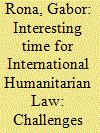

|
|
|
| 9 |
ID:
060485


|
|
|
|
|
| Publication |
Jan 2005.
|
| Summary/Abstract |
Human rights embody universal values that cannot be compromised but there are regional specificities and times of conflict when adherence to absolute values may not be possible. This is not to suggest that human rights in conflict zones can be trampled upon. What is argued here it that circumstances need being given due weight if an impartial view is to be adopted. This hypothesis is argued by reviewing the human rights situation in Kashmir, noticing the parties in contention, and the legal and judicial routes available for redress, before suggesting several remedies to improve the protection of human rights in this zone of conflict.
|
|
|
|
|
|
|
|
|
|
|
|
|
|
|
|
| 10 |
ID:
060489
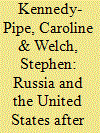

|
|
|
|
|
| Publication |
Jan 13, 2005.
|
| Summary/Abstract |
We begin by briefly surveying and discussing approaches to the study of Russian foreign policy after the Cold War. These largely descriptive approaches fail to provide much purchase on the new circumstances obtaining after 9/11. Instead we consider the ‘war on terror’ from a broadly constructivist perspective as a new international paradigm. We describe its main features, and then consider its implications for Russian-American relations in three policy areas: Chechnya, neighbouring states, and internal security. We find in these areas both opportunities and dilemmas for Russian foreign policy.
|
|
|
|
|
|
|
|
|
|
|
|
|
|
|
|
| 11 |
ID:
060464


|
|
|
| 12 |
ID:
060463


|
|
|
|
|
| Publication |
Jan 2005.
|
| Summary/Abstract |
This paper explores contemporary counterterrorism efforts as an instrument for attaining peace as a ‘global public good’. It notes the lack of an agreed definition of terrorism, the distinction between freedom-fighting and terrorism, and the issue of ‘excessive use of force’ by the state. It assessed the extent to which US counter-terrorism policy has influenced policy in the UN Security Council, and the shortcomings in Council policy that require redress. The paper concludes that counterterrorism will be successful only when a ‘global law enforcement’ approach prevails over the national security-driven ‘war-on-terror’ and when genuine efforts are undertaken to address the root causes of terrorism, including the forward basing of US forces in the Arab world.
|
|
|
|
|
|
|
|
|
|
|
|
|
|
|
|
| 13 |
ID:
060487
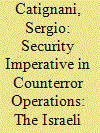

|
|
|
|
|
| Publication |
Jan 2005.
|
| Summary/Abstract |
Israel has had a long tradition of fighting international and Palestinian terror. This article looks at how Israel counterterrorism strategy and tactics have developed since the establishment of the State in 1948. By initially providing a working definition of terrorism, the article then goes to show how Israel has sought to defend itself from different Palestinian terror tactics. This article shows how Israeli security forces have struggled safeguarding, and sometimes disregarded Palestinian human rights. This article concludes by arguing that given the responsibility of democratic governments of defending their citizens from imminent terror attacks, such governments often find themselves paradoxically violating human rights. Despite attempts to reduce such human rights abuses, governments will never do so at the expense of their own security.
|
|
|
|
|
|
|
|
|
|
|
|
|
|
|
|
| 14 |
ID:
060471


|
|
|
|
|
| Publication |
Jan 2005.
|
| Summary/Abstract |
The author of this article is one of the attorneys appointed to represent Zacarias Moussaoui in the United States. Mr. Moussaoui is the only person facing criminal charges for alleged involvement in the September 11 plot. The author describes the system of government in the United States with a specific emphasis on several terrorism cases pending in the United States. He seeks to assure the readers that the rule of law is paramount in the United States. Recent decisions of the Supreme Court—in the Hamdi and Guantanamo cases—that confirm the constitutional rights of even the most dedicated enemies of the United States, which decisions post-date this submission, only affirm the writer's theme.
|
|
|
|
|
|
|
|
|
|
|
|
|
|
|
|
| 15 |
ID:
060462
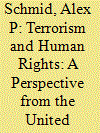

|
|
|
|
|
| Publication |
Jan 2005.
|
| Summary/Abstract |
The chapter begins with a discussion of the draft definition of terrorism in the UN Ad Hoc Committee on Terrorism, a definition which covers both terrorist blackmail and intimidation of target audiences but does not address the terrorist goal of impressing potential and actual constituencies with their “propaganda by the deed”. It distinguishes then between a military response to terrorism, based on maximum force within the framework of the laws of war, and a law enforcement response, based on minimal use of force, within the framework of the rule of law. Subsequently twelve principles of the rule of law are outlined and their relationship to human rights is clarified. Next a discussion of specific human rights and how they relate to terrorism and countering terrorism follows. The activities of the Terrorism Prevention Branch of the UN Office on Drugs and Crime are discussed in the framework of the three-pronged UN Strategy against international terrorism. The chapter ends by stressed that upholding human rights and effective anti-terrorist measures are not exclusive. On the contrary: human rights and the rule of law are essential tools in the effort to combat terrorism.
|
|
|
|
|
|
|
|
|
|
|
|
|
|
|
|
| 16 |
ID:
060488
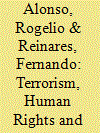

|
|
|
|
|
| Publication |
Jan 2005.
|
| Summary/Abstract |
Terrorism systematically violates human rights and disrupts basic political processes common to liberal democracies. Combating terrorism is thus necessary in order to protect these fundamental rights and maintain the well functioning of tolerant polities. However, state initiatives put in place to cope with terrorism may also damage human rights, even when these measures are formulated by elected accountable authorities and implemented in the context of open societies. Spain has precisely been among those European countries most affected by the wave of terrorism initiated more than three decades ago across western industrial societies, and thus where violations of fundamental rights as well as obstacles to the exercise of civil liberties as a consequence of such violence became particularly severe. Also, a case where effective rule of law was temporarily damaged in the fight against the ethnonationalist terrorism perpetrated by ETA (an acronym for Euskadi ta Askatasuna, meaning Basque Homeland and Freedom) but successfully restored by efforts from both state institutions, as a result of an effective division of power, and civil society. It is therefore an experience providing substantive knowledge and valuable insights on how to counter terrorism in accordance with the principles and procedures of democracy. Accordingly, this paper aims at a better understanding on the interrelated issues of terrorism, human rights and law enforcement in a context of political change.
|
|
|
|
|
|
|
|
|
|
|
|
|
|
|
|
| 17 |
ID:
060461
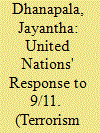

|
|
|
|
|
| Publication |
Jan 2005.
|
| Summary/Abstract |
The United Nations has been at the forefront of the global campaign against terrorism after the events of September 11, 2001, giving the campaign legitimacy and universality. The Security Council acted with remarkable speed with its Resolution 1373 and set up the Counter Terrorism Committee with extensive powers. Its UK Chairman provided able leadership but reservations over human rights issues, lack of funding for assistance, and the danger of duplicating the work of other UN bodies with specific mandates have been revealed as deficiencies. The General assembly condemned the events of 9/11 and held debates on the subject later. The Secretariat's views were expressed by several eloquent statements of the Secretary-General and in a policy working group report that advocated a tripartite strategy of “discussion–denial–cooperation” and made 31 recommendations. Counter terrorism is only one tool in tackling terrorism. Human rights concerns must be addressed. A separate, functional commission under the Economic and Social Council is recommended to provide the international community with a universal forum for a focused discussion on terrorism.
|
|
|
|
|
|
|
|
|
|
|
|
|
|
|
|
|
|
|
|
|